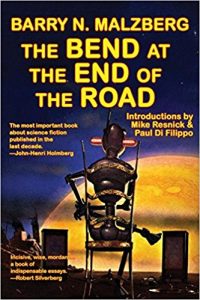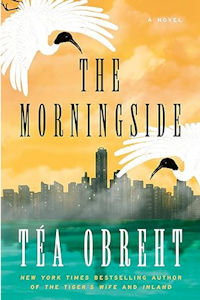Russell Letson reviews The Bend at the End of the Road by Barry N. Malzberg
 The Bend at the End of the Road, Barry N. Malzberg (Fantastic Books 978-1-5154-1038-6, $13.99, 161pp, tp). May 2018.
The Bend at the End of the Road, Barry N. Malzberg (Fantastic Books 978-1-5154-1038-6, $13.99, 161pp, tp). May 2018.
When I started reviewing for this magazine, the only instruction I recall getting from Charles Brown was ‘‘Don’t argue with the book.’’ I have tried to follow that dictum over the years, but it is very hard not to argue with Barry Malzberg’s The Bend at the End of the Road – and it was just as hard to stop reading it. The 26 short essays in this collection originally appeared in Baen’s Universe (2007-10) and Galaxy’s Edge (2013-17). They confront matters of aesthetics, commerce, and culture in literature in general and SF in particular and are a thematic and occasionally autobiographical sequel to Malzberg’s two earlier books of similar pieces: The Engines of the Night (1982) and Breakfast in the Ruins (2007). (The latter volume reprints the former and adds an equal amount of new material.)
Malzberg’s view of the field in and around which he has spent much of his professional life is not a happy one, though this is not news to anyone familiar with Breakfast in the Ruins, in which he writes that science fiction ‘‘was founded upon penury, isolation, damage and failure’’ and reflects on ‘‘how much the history of our little genre is a history of failure.’’ The Bend at the End of the Road is no more cheerful, though, like the earlier books, it is often strikingly written and shot through with sharp observations of and confrontations with the marginal cultural and economic status that has often constrained the field’s (and Malzberg’s) aspirations. It is this merging of the interesting and insightful with the depressive and depressing that makes the collection as exasperating as it is fascinating.
I grope for more words to characterize these essays: they are angry, conflicted, disappointed, despairing, elegiac, eloquent, embittered, frustrated, intense, melancholy, weary, wide-ranging. Here’s a leitmotif that runs through the whole:
We’re in trouble, folks. We have been in trouble for a long time. The science fiction that the aged among us loved, which shaped and darkened and exploited and framed us, that science fiction has become a decadent and marginal form of human activity.
The short pieces that make up the book include snapshots and ex parte accounts of various career arcs, featuring a set of exemplary figures: Alfred Bester, Algis Budrys, Harry Harrison, C.M. Kornbluth, Henry Kuttner (and less frequently C.L. Moore), Judith Merril, H. Beam Piper, Frederick Pohl, Theodore Sturgeon, James Tiptree, Jr./Alice Sheldon. Many of these are depicted as failed, self-deceived, self-destructive, isolated, martyred, too-soon-dead (and thus spared martyrdom?), and unpleasantly fated in various other ways. Malzberg is particularly fascinated by the suicides (Piper and Tiptree/Sheldon) and burnouts and deserters (Bester, alcoholic; Merril, self-exiled).
Even the successful and beloved – Asimov and Heinlein – are shaded by the failed promises and empty victories of science fiction and its subculture. An essay that includes a sharp description of Heinlein’s Golden Age achievements as craftsman ends with a picture of the writer gazing into the abyss, or, in the piece’s actual metaphor, a mirror ‘‘from which stared his own, his stricken… and utterly barren self. The man was science fiction. We are science fiction. Science fiction is the world.’’
There are, to be sure, also fondly remembered, admired, or at least not-utter-failure figures: Harry Harrison, Frederik Pohl, early Bester, William Tenn, Budrys before he became a disappointment. But even these are seen in the context of a literary enterprise that has failed itself and its best practitioners long ago. Not that SF is unique, as demonstrated by other ghosts haunting these pages: Diane Arbus (suicide, again), James Agee (dead too young – and alcoholic, again), Marilyn Monroe (suicide, and oddly compared to Heinlein), and Orson Welles (an emptied vessel, explicitly compared to Bester).
So what kept me reading these thousand-word lacerations and laments? On the purely literary and historical side, Malzberg has a considerable knowledge of the history of American SF, much of it acquired at first hand from the late 1940s onward, and he has also paid attention to modern literature in general, from the great New York newspaper sports writers to Raymond Carver, Philip Roth, John Cheever, Reynolds Price, and George P. Elliott (his mentor at Syracuse University). Line by line, the writing is dense with allusions from all over the literary-cultural landscape, products of a mind that frantically connects everything to everything. A single page of one essay (‘‘Misunderstanding Entropy’’) contains a crescendo of references: nine writers, four composers, four books, two media franchises, plus Donald Trump, Tammany Hall, and ComicCon. Prose like this can be, despite the general atmosphere of futility and disappointment, exhilarating.
I have tried to extract a literary model or theory from these essays, but despite flashes of insight and historical connection, critical matters tend to dissolve into the personal or the biographical-anecdotal. Science fiction is portrayed as tied to the promise and collapse of hope of the last century, fatally infected by the pathologies and technologies that produced Hiroshima, Vietnam, and 9/11, a failure rooted in the fact that ‘‘the human spirit was never equipped to overcome or even shape the consequences of that technology.’’ Malzberg writes that
science fiction had always been a literature (and a social phenomenon and a context) of self-destruction, that it was [so] at the heart from the beginning. Apocalyptic technology, wretched destruction, hubris and Colonus, Oedipus and the Machine: any part of the forest you observed, death and dishevelment seemed to lurk at the corners…. always a kind of narrative built upon destruction and ad astra was merely another name for desertion.
Malzberg is not the first or only commentator to consider some of these matters – the pathologies of the marketplace, the strained relationship of SF (or any genre fiction) to ‘‘literature,’’ the questions of exactly what it is that science fiction addresses and whether the form is exhausted, the price paid for following a particular muse. But his treatment of them is so tied to the personal – to the trials and frustrations of that array of martyrs and failures and to his own professional discontent and existential angst – that it is tempting to question the whole unhappy narrative. Or, as I eventually decided, to read the essays less as literary criticism and more as a cross between memoir and poetry – strong on affect, weak on systematic analysis. A final caveat about that memoir side: Malzberg is not quite six years older than I am, so I have witnessed many of the events and moments he mentions, though, to be sure, from a very different angle and distance. I have met and observed some of these people, though, even been mildly acquainted with others, and I have to say that our inner weather reports are quite different. There are portraits and characterizations in Bend that will raise eyebrows or perhaps ire. I am less willing to argue with the author’s memories than I am to argue with his vision of SF, but I wonder whether Malzberg has become an unreliable narrator (however eloquent and impassioned) in the tale of his own times.
This review and more like it in the June 2018 issue of Locus.
 While you are here, please take a moment to support Locus with a one-time or recurring donation. We rely on reader donations to keep the magazine and site going, and would like to keep the site paywall free, but WE NEED YOUR FINANCIAL SUPPORT to continue quality coverage of the science fiction and fantasy field.
While you are here, please take a moment to support Locus with a one-time or recurring donation. We rely on reader donations to keep the magazine and site going, and would like to keep the site paywall free, but WE NEED YOUR FINANCIAL SUPPORT to continue quality coverage of the science fiction and fantasy field.







Dear Russell Letson,
Thank you for this serious, considered examination of latest BNM.
Linked below find relevant recent (13 July 2018) exchange with BNM.
https://fsgworkinprogress.com/2018/07/13/malzberg-reading-daniels-reading-malzberg/